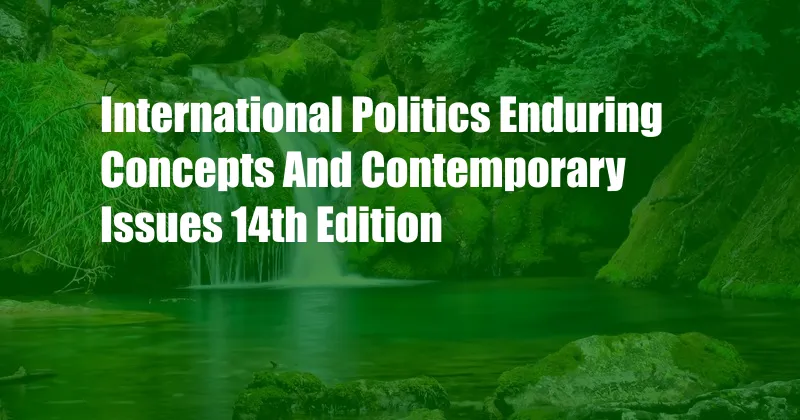
International Politics: Enduring Concepts and Contemporary Issues
In today’s globalized world, where events in one corner can have profound implications in another, understanding international politics has become imperative. This article explores the enduring concepts and contemporary issues that shape the dynamic landscape of international relations.
The Evolution of International Politics
International politics, as we know it today, has evolved over centuries, tracing its roots back to ancient times. The concept of the nation-state, the balance of power, and the development of international law are just a few of the enduring concepts that continue to influence global affairs.
The Treaty of Westphalia (1648), often regarded as a seminal moment in international law, established the principle of sovereignty and laid the foundation for the modern system of nation-states. The concept of the balance of power, which emerged during the 18th century, sought to maintain an equilibrium between competing powers, reducing the likelihood of widespread conflict.
Contemporary Issues in International Politics
In the 21st century, international politics is characterized by a complex interplay of traditional and emerging forces. Globalization, technological advancements, and environmental challenges pose new challenges and opportunities for nations worldwide.
Economic Interdependence:
The rise of globalization has led to increased economic interdependence among nations. International trade, investment, and finance are now interconnected, creating both benefits and vulnerabilities for states.
Security Threats:
Terrorism, cyberwarfare, and the proliferation of nuclear weapons remain significant threats to international security. The rise of non-state actors and the increasing accessibility of advanced technologies have made it more challenging to address these threats.
Climate Change:
Climate change has emerged as a major contemporary issue, with profound implications for international cooperation and global security. The need to mitigate greenhouse gas emissions and adapt to climate change poses challenges that require collective action.
Tips and Expert Advice for Navigating International Politics
Navigating the complex world of international politics requires astute understanding and strategic foresight. Here are some tips and expert advice from experienced observers:
Embrace Interculturalism:
Understanding and respecting different cultures is crucial for effective communication and cooperation in international relations.
Foster Diplomacy:
Diplomacy remains a fundamental tool in resolving conflicts and building bridges between nations. Engaging in dialogue, negotiation, and compromise is essential for maintaining peaceful relations.
Monitor Global Developments:
Staying abreast of global events and trends is vital for making informed decisions and anticipating potential challenges or opportunities.
Frequently Asked Questions on International Politics
Q: What is the role of the United Nations in international politics?
A: The United Nations is an international organization established after World War II to promote peace, security, and cooperation among nations. It provides a platform for dialogue, conflict resolution, and the promotion of economic and social development.
Q: How does international law affect global affairs?
A: International law provides a framework for regulating relations between nations. It governs issues such as territorial disputes, human rights, environmental protection, and the use of force. Adherence to international law helps maintain stability and reduces the likelihood of conflict.
Conclusion
International politics continues to evolve, shaped by enduring concepts and contemporary issues. Understanding these factors is essential for navigating the complexities of the globalized world and fostering a peaceful and prosperous future.
Whether you are a student of international relations, a diplomat, or simply a concerned citizen, engaging with the topic of international politics is not only enlightening but also empowers you to make informed choices and contribute to a better world.